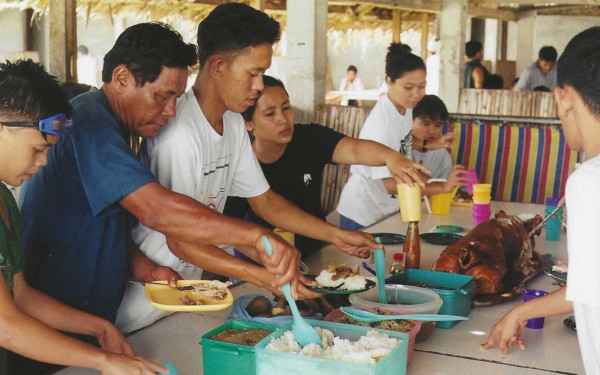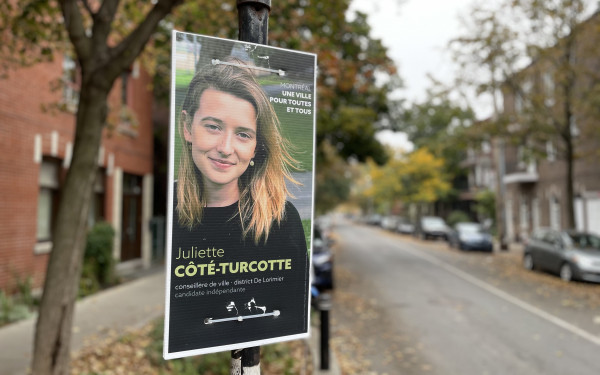How France Stohner is transforming Filipino identity and municipal politics
As the first Filipina to run in Snowdon, France Stohner is redefining municipal politics and Filipino identity. Photo Esteban Cuevas
As the first Filipina to run in Snowdon, community leadership is her main priority
Fresh from helping out at the MultiCaf Mobile Market, France Stohner, the first Filipina to run for city councillor in Snowdon, greeted me with a wave and a sparkling smile.
Fresh from helping out at the MultiCaf Mobile Market, France Stohner, the first Filipina to run for city councillor in Snowdon, greeted me with a wave and a sparkling smile.
We walked from Nelson Mandela Park to Morena, a Filipino restaurant known for its fried chicken, who recently celebrated their two year anniversary. On the way, Stohner poked her head into the print shop she’s been going to during her campaign to say hello. She inquired about the cashier’s mom, who wasn’t there that day. “Tell her I say hi!” she called through the door.
We stopped again a couple doors down, since she wanted to get flowers for the restaurateurs. The flower shop was closed, so we went to the restaurant empty handed. Regardless, the employees inside were just as excited to see her as she was to see them.
We ordered tapsilog, a Filipino breakfast consisting of cured beef, garlic fried rice, and a perfectly runny fried egg. We waited for our food outside at a picnic table and basked in the abnormally warm October weather. Stohner was dressed to work; she and the rest of Sue Montgomery’s Courage team volunteer at the Mobile Market every Wednesday where they hand out fresh produce to Côte-des-Neiges–Notre-Dame-de-Grâce residents.
“Our culture deserves the effort, our culture deserves the remembering.” — France Stohner
She later shed her grey crewneck in favour of a black tank top, revealing more tattoos than just the ones wrapping around her hands. As she fastened her hair before we started eating, she looked like she could’ve been in a Creamsilk commercial—never ending black locks and all. Around her neck she wore a gold necklace reading “Kalayaan”, Tagalog for “freedom”, but also her son’s name.
“How do I make sure he knows he's Filipino?” she said. “It was really important for me, for him to have a specifically Filipino name.”
“And I know I screwed him by giving him a name that's hard for folks, but the way I see it also is that our culture deserves the effort, our culture deserves the remembering,” she said. “And at the end of the day, it's always white supremacy—because people for some reason can pronounce and have no problem remembering Dostoyevsky, or Czajkowski, or complicated eastern European names that—surprise, surprise—happen to be white.”
Stohner and I dove into a discussion of so-called “traditional Filipino names,” but she quickly pointed out that none of them are truly traditional. The names of my aunts are all post-colonial Spanish names. Ernesta, Beatrice, Carolina, none of these names existed before Spain.
“So I was like, ‘Sorry, kid. You're going to be the kid who's going to be like, ‘No, it's Ka-la-ya-an.’” she added. This action of forcing people to get his name right, Stohner said, will force them to learn more about Filipino culture—and make them respect it.
“I think I’ve always been a feminist, but didn’t know or have the words or the language for it.” — France Stohner
Stohner arrived in Côte-des-Neiges when she was two years old, following her aunt’s arrival in the 1970s. “My aunt told me that Canadian government officials were literally at the door of her university after her convocation and being like, ‘Hi, you want to move to Canada? We need nurses.’”
Since her aunt’s education was recognized, Stohner said it allowed her and others who arrived during that wave of immigration to have an easier time establishing themselves. Not long after getting Canadian citizenship, she began to sponsor family members—including Stohner and her parents. But by then it was the 1980s, and the borders were getting tighter. In turn, Stohner’s mother’s education wasn’t recognized.
“She's from that wave of migration that was de-professionalized, which happened to so many people in our communities,” Stohner said. “We definitely weren't as comfortable as my aunt was. [...] I grew up with pretty limited resources in the neighbourhood. We struggled quite a bit.”
Although she dropped out of high school, Stohner was able to move into higher education by later making up credits she had missed. “If you would have told me that I was going to do a bachelor’s, I was going to do a master’s, I was going to become a therapist, I would have probably laughed because that really wasn't my reality,” she said.
She started at Concordia as an independent student, dabbling in an array of different subjects. Coming from poverty and with no academic role model, she was missing a compass to guide her through her education.
Read more: University is a luxury that many poor students can’t afford

“I think I'm supposed to get a degree, but I don't really know,” she recalled thinking to herself. “I was always trying to figure out stuff on my own.”
It was at the Simone de Beauvoir Institute that everything started to fall into place.
“I think I've always been a feminist, but didn't know or have the words or the language for it. It was really at SDBI that I was like, ‘Oh, all of these things that I've lived are actually not my fault?” she said. “For the longest time I was like, ‘Why am I so poor? Why can't I have money? Am I stupid? I must be stupid because I can't finish high school.”
“It wasn't because I was stupid. It was because I didn't have that proper support,” she said about the systemic barriers that threw wrenches in her academic career.
While in university, Stohner held a part-time job bartending and waitressing to pay for tuition and rent. “It took me six or six and a half years because I had to go part-time while working. And that's really the reality of so many people in [the Filipino] community. We can't afford to go to school full-time,” she said.
After graduating in 2013, she was left wondering what to do next. So she ran away to the Philippines.
Stohner travelled to the Philippines in 2014, after Typhoon Yolanda hit, to do relief work. She worked with a women’s organization there, distributing food and making sure people had housing. She was also able to spend time learning from some of the Philippines’ Indigenous communities.
“There are so many people making decisions for our community who don’t look like us,” she said. “They might have their heart in the right place, but they just really, really don’t know the realities of what goes on in our community.” — France Stohner
“I was always reading about [decolonialism] through other cultures, so I'm very grateful and very blessed that this knowledge I carry today is because of my exposure to amazing Black feminist writers, Indigenous feminist writers, and other BIPOC feminist writers,” she said. “But it wasn't until literally my last year of my undergrad that I found Filipina feminist writers.”
After coming back to Canada, Stohner decided to pursue a master’s degree in counselling, psychotherapy, and spirituality at the University of Ottawa. The root of many of the problems faced by the Filipino community come down to the taboo surrounding mental health, Stohner explained. “We're lacking emotional education, we're lacking emotional vocabulary, which helps us with things like community building, conflict resolution.”
“If you go back to pre-colonial times, [the Philippines was] very matriarchal. We were very community-oriented. We were very collective governance-oriented,” she said about how the Philippines once functioned. “And that's kind of what we're trying to bring into politics now. I don't want to just be the voice or the access for the people. I want citizen leadership.”
“There are so many people making decisions for our community who don't look like us,” she said. “They might have their heart in the right place, but they just really, really don't know the realities of what goes on in our community.”
Stohner never could have guessed her experiences would lead her to municipal politics. During her time at Concordia, her family members often asked what she would do after graduation with a degree in women’s studies. The aunts who questioned her choices before are now rejoicing, telling her, “Good thing you studied women’s studies. We need women in politics.”
“If team Courage wins, for us, it’s schools, it’s community centres, it’s biodiversity, green spaces, it’s collective community gardens. All of that. If our opponents win, it’s luxury condos.” — France Stohner
She also interned at Women in Cities International, an non-governmental organization for urban development for women’s safety in cities. It was there that she began to see cities differently. She began noticing that some streets need more lights because a lot of women live there and it should be well-lit, or that bus services should be extended in certain areas because a lot of women work late in this area.
Her riding of Snowdon is also one that hasn’t changed councillors in 39 years. Marvin Rotrand, who held the city councillor seat since 1982, is retiring.
“No one expected a Filipino to run for Snowdon because that also means being responsible for a major artery in the city, the Decarie, and being responsible for a lot of businesses. You know, like they don't expect a woman to do that,” she said.
If elected, the land once occupied by the Hippodrome de Montréal would also fall under her jurisdiction. “If team Courage wins, for us, it’s schools, it's community centres, it’s biodiversity, green spaces, it’s collective community gardens. All of that. If our opponents win, it's luxury condos.”
One thing Stohner hopes for, above all, is a higher voter turnout. Côte-des-Neiges sees a lot of political apathy, so residents don’t show up to vote, she said. Through her community organizing and campaigning, she hopes to have woken up some collective consciousness.
With the polls closing on Nov. 7, one question hangs in the air: “Are people ready for a tattooed decolonized Pinay?”




